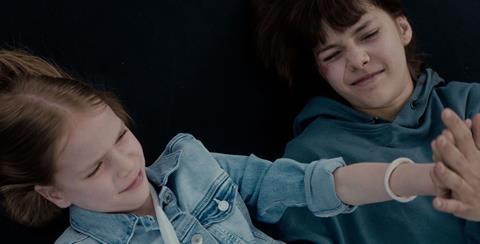Latvian director Linda Olte’s debut explores the failings of the country’s care system through the eyes of a 13 year-old girl

Dir/scr: Linda Olte. Latvia-Italy. 104mins
Caught in Latvia’s overstretched, underfunded care system, a pair of siblings grapple with the prospect of moving to America to live with a foster family. In Latvian director Linda Olte’s debut Sisters, that life changing event is not presented as the ultimate happy ending but rather another unwelcome obstacle in the path of wilful 13 year-old Anastasia (impressive first-timer Emma Skirmante). And while the film may be rather heavy-handed in delivering some elements of its message, it adroitly navigates that liminal space between childlike vulnerability and bullish independence.
It’s in its less contrived moments that ’Sisters’ finds its power
Premiering at the Warsaw Film Festival before a release on home turf on October 20 through Baltic Content Media, Sisters — which won the Screen International Buyer’s Choice Award at the MIA Market 2021 — should attract attention thanks to its evergreen subject matter and strong naturalistic performances from its young cast of newcomers. Further festival play may follow, particularly in programmes with a focus on social issues.
There are immediate echoes of Nora Fingscheidt’s System Crasher in both the film’s premise and our introduction to Anastasia and younger sister Diana (Gerda Aljena) as they tear through the local dog pound, liberating the canines. Anastasia is, however, much older than Fingscheidt’s similarly defiant nine year-old protagonist, and the film explores that adolescent terrain with gusto.
Like all young people on the cusp of adulthood, Anastasia is struggling to find out who she is; even more of an impossibility when she lives in a raucous, packed-to-the-rafters orphanage. The smiley-face sticker on the toaster is a poignant irony; despite the best efforts of the staff, it’s impossible to give each child the attention they need. Anastasia’s moods swing wildly. She shoplifts and destroys things when she’s angry, but cares tenderly for her niece (mum is older sister Julija played by Katrina Kreslina). She is desperate to remake her family with her mother, Alla (Iveta Pole), but Alla is less than reliable: she constantly promises her kids the world, only to repeatedly let them down.
That Anastasia nevertheless views this as a better option than moving to America with a wealthy, stable and commited foster family demonstrates her immaturity without patronising or demeaning her. This situation is an emotional responsibility she’s ill-equipped to handle; particularly because the state won’t separate siblings, so her decision will also impact Diana. Other well-handled scenes with an older man, who uses suggestive flattery to manipulate her into carrying drugs for him, also highlight her naivety. Despite her razor-sharp edges, honed by years in the care system, Anastasia actually has very little agency in her own life.
That’s not just a product of her age, however, but also the land of limited opportunities in which she lives. Both Julija, who now lives in a tiny flat with a baby she can’t care for, and her mother Alla grew up in the same care home in which Anastasia now lives. That Anastasia is trapped in a vicious cycle of neglect is an idea underscored by sequences of her pushing herself round on a decrepit roundabout in a wasteland playground.
This obvious visual metaphor is not the only way time that Sisters leans too heavily into the melodrama of Anastasia’s desperate situation. The humiliating fact that she is unable to create a family tree for a school project is further compounded when her mother fails to turn up for parents day; she sits alone as her classmates sing a twee song about how grateful they are for their parents’ support. Elsewhere, the rather on-the-nose names of her potential American mother and sister are Grace and Joy, although this will become another wry irony as Anastasia refuses to conform to their conservative ideas of faith and femininity.
Sisters finds its power in less contrived moments, particularly those in which the camera lingers on Anastasia’s face when she enjoys some laughter with her mother — a fleeting moment which will sustain her notions of being happily reunited — sings to her niece or hugs her sister. These chinks of normality, of what could be, offer genuine light in the darkness. It’s credit to Olte’s commitment to her character, and to the realities of the failings of the system, that she allows Anastasia to be master of her own fate, however unqualified the youngster may be for that role.
Production companies: Fenixfilm, Albolina
International sales: True Colours info@truecolours.it
Producers: Una Celma, Matiss Kaza, Debora Nischler, Dace Siatkovska
Cinematography: Aleksandrs Grebnevs
Production design: Laura Dislere
Editing: Linda Olte, Andris Grants
Music: Federico Campana
Main cast: Emma Skirmante, Gerda Aljena, Victoria Mayers-Gray, Bella Alexandras, Iveta Pole, Elita Klavina, Neil McGarry, Katrina Kreslina






















